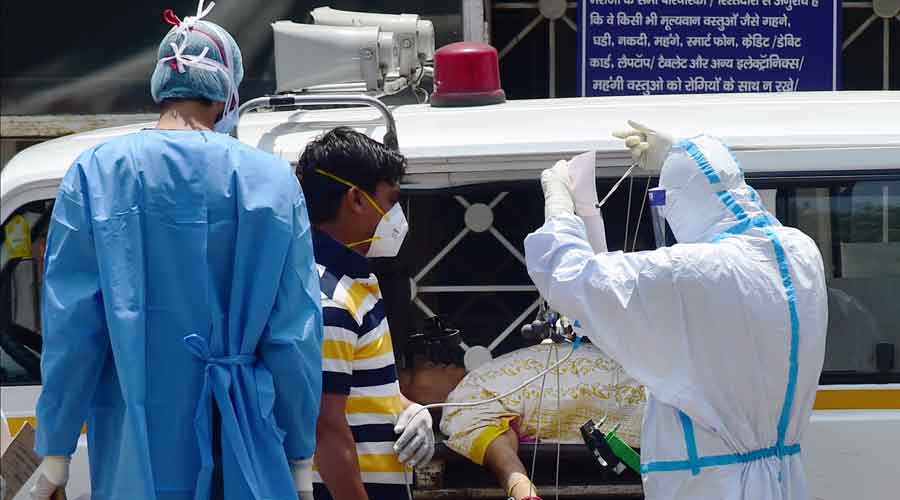
Virologist quits as chair of scientific advisory group- Scientist part of govt consortium tracking variants
Shahid Jameel recently wrote how his fellow scientists 'are facing stubborn resistance to evidence-based policymaking' in a New York Times guest article

Shahid Jameel sent his resignation to the Union health ministry and the science ministry’s biotechnology department, the agencies supporting the Indian National SARS-CoV-2 Genomics Consortium (Insacog), two senior consortium scientists told The Telegraph.
The resignation comes days after Jameel published a guest article in The New York Times on India’s Covid-19 epidemic, where he wrote that his fellow scientists “are facing stubborn resistance to evidence-based policymaking”.
The two senior consortium scientists contacted by this newspaper declined to speculate about Jameel’s resignation. “We’re sad to lose him,” one of them said.
Jameel, contacted by this newspaper, declined comment.
Jameel chaired the scientific advisory group to the consortium which is tasked with sequencing coronavirus variants across the country to determine their role in the epidemic and, if possible, predict future changes.
The consortium’s efforts have suggested that a variant named B.1.617 observed to be more infectious than earlier variants has contributed to the sharp surge of infections across India since February.
The World Health Organisation designated B.1.617 as a “variant of concern” last week.
Some consortium scientists, however, have for weeks been concerned about the slow pace of sequencing and what they view as a conspicuous lack of the epidemiological data necessary to understand how the variants are spreading and affecting the disease pattern and severity in India.
The Centre had announced the establishment of Insacog in late December but until at least the third week of March this year, the consortium had not received funds to support the sequencing efforts. The scientists had been asked to borrow funds from other projects.
“Insacog has been slow but we have generated very useful data,” one consortium scientist said.
Jameel had earlier this month, in an online video interview with another media organisation, expressed concern that India had allowed the virus to spread and cause “mayhem”.
“Don’t let me give you this message that it is the virus alone that has caused this mayhem,” Jameel had said.
“We allowed the virus to do this. The virus, of course, infected people and will continue to infect people as long as there are susceptible people. But we gave it the opportunity not to just spread but to spread so quickly.”
During the video interview, Jameel had also said that India’s Covid-19 cases had continued to fall from the previous peak last September till February, even through the festivals during October and November.
“All through the time as our graph was going down, we and our leaders started thinking we had conquered Covid,” Jameel said.
“But you just had to look around. Every country in the world that peaked before us (had) a second wave before us. But we were constantly fed this narrative and we started believing the narrative that somehow Indians are special.”
Jameel said several “superspreader events” such as weddings, local body elections, state elections, and religious congregations such as the Kumbh Mela would have provided opportunities for the virus to spread at a time when a more infectious variant had emerged in India.
“First we became complacent and then this variant virus caught us at the right time, right time for the virus, wrong time for us. This together caused this mayhem that we’re looking at,” he said.
Multiple public health experts, including some government medical researchers and members of national or state Covid-19 task forces, have expressed similar concerns to this newspaper over the past four weeks.
“We’re unable to articulate some of these things,” one expert had said on the condition of anonymity earlier this month. Another expert and member of a task force had said he believed India had collectively failed to act on some early warning signals.
Other scientists too had expressed concerns about policies not guided by evidence. One example, they said, was the Union health ministry’s persistent denial of community transmission of Covid-19 for which evidence had been available by April 2020.
“Community transmission will happen only when they say it will happen,” a senior consortium scientist had told this newspaper last month. “We can’t do anything about this really. I wish things were different.”

0 Response to "Virologist quits as chair of scientific advisory group- Scientist part of govt consortium tracking variants"
Post a Comment
Disclaimer Note:
The views expressed in the articles published here are solely those of the author and do not necessarily reflect the official policy, position, or perspective of Kalimpong News or KalimNews. Kalimpong News and KalimNews disclaim all liability for the published or posted articles, news, and information and assume no responsibility for the accuracy or validity of the content.
Kalimpong News is a non-profit online news platform managed by KalimNews and operated under the Kalimpong Press Club.
Comment Policy:
We encourage respectful and constructive discussions. Please ensure decency while commenting and register with your email ID to participate.
Note: only a member of this blog may post a comment.